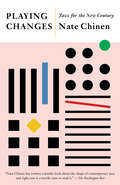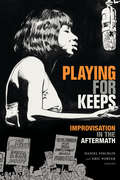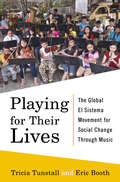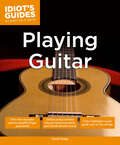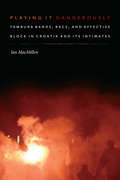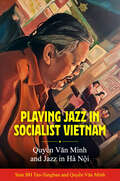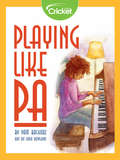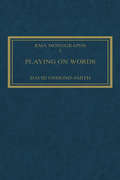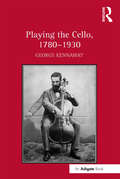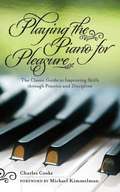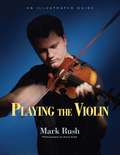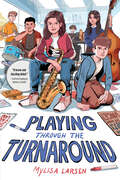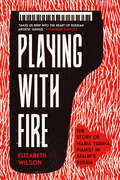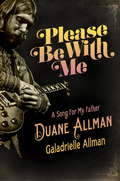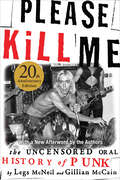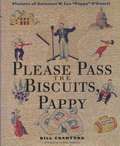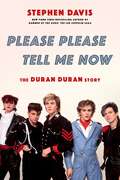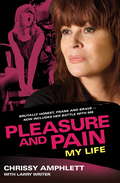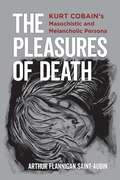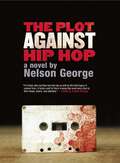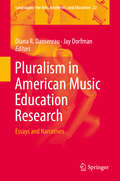- Table View
- List View
Playing Changes: Jazz for the New Century
by Nate ChinenOne of jazz’s leading critics gives us an invigorating, richly detailed portrait of the artists and events that have shaped the music of our time. Grounded in authority and brimming with style, Playing Changes is the first book to take the measure of this exhilarating moment: it is a compelling argument for the resiliency of the art form and a rejoinder to any claims about its calcification or demise.“Playing changes,” in jazz parlance, has long referred to an improviser’s resourceful path through a chord progression. Playing Changes boldly expands on the idea, highlighting a host of significant changes—ideological, technological, theoretical, and practical—that jazz musicians have learned to navigate since the turn of the century. Nate Chinen, who has chronicled this evolution firsthand throughout his journalistic career, vividly sets the backdrop, charting the origins of jazz historicism and the rise of an institutional framework for the music. He traces the influence of commercialized jazz education and reflects on the implications of a globalized jazz ecology. He unpacks the synergies between jazz and postmillennial hip-hop and R&B, illuminating an emergent rhythm signature for the music. And he shows how a new generation of shape-shifting elders, including Wayne Shorter and Henry Threadgill, have moved the aesthetic center of the music. Woven throughout the book is a vibrant cast of characters—from the saxophonists Steve Coleman and Kamasi Washington to the pianists Jason Moran and Vijay Iyer to the bassist and singer Esperanza Spalding—who have exerted an important influence on the scene. This is an adaptive new music for a complex new reality, and Playing Changes is the definitive guide.
Playing for Keeps: Improvisation in the Aftermath (Improvisation, Community, and Social Practice)
by Daniel Fischlin Eric PorterThe contributors to Playing for Keeps examine the ways in which musical improvisation can serve as a method for negotiating violence, trauma, systemic inequality, and the aftermaths of war and colonialism. Outlining the relation of improvisatory practices to local and global power structures, they show how in sites as varied as South Africa, Canada, Egypt, the United States, and the Canary Islands, improvisation provides the means for its participants to address the past and imagine the future. In addition to essays, the volume features a poem by saxophonist Matana Roberts, an interview with pianist Vijay Iyer about his work with U.S. veterans of color, and drawings by artist Randy DuBurke that chart Nina Simone's politicization. Throughout, the contributors illustrate how improvisation functions as a model for political, cultural, and ethical dialogue and action that can foster the creation of alternate modes of being and knowing in the world.Contributors. Randy DuBurke, Rana El Kadi, Kevin Fellezs, Daniel Fischlin, Kate Galloway, Reem Abdul Hadi, Vijay Iyer, Mark Lomanno, Moshe Morad, Eric Porter, Sara Ramshaw, Matana Roberts, Darci Sprengel, Paul Stapleton, Odeh Turjman, Stephanie Vos
Playing for Their Lives: The Global El Sistema Movement for Social Change Through Music
by Eric Booth Tricia TunstallAn eye-opening view of the unprecedented global spread of El Sistema--intensive music education that disrupts the cycles of poverty. In some of the bleakest corners of the world, an unprecedented movement is taking root. From the favelas of Brazil to the Maori villages in New Zealand, from occupied Palestine to South Central Los Angeles, musicians with strong social consciences are founding intensive orchestra programs for children in need. In this captivating and inspiring account, authors Tricia Tunstall and Eric Booth tell the remarkable story of the international El Sistema movement. A program that started over four decades ago with a handful of music students in a parking garage in Caracas, El Sistema has evolved into one of classical music's most vibrant new expressions and one of the world's most promising social initiatives. Now with more than 700,000 students in Venezuela, El Sistema's central message--that music can be a powerful tool for social change--has burst borders to grow in 64 countries (and that number increases steadily) across the globe. To discover what makes this movement successful across the radically different cultures that have embraced it, the authors traveled to 25 countries, where they discovered programs thriving even in communities ravaged by poverty, violence, or political unrest. At the heart of each program is a deep commitment to inclusivity. There are no auditions or entry costs, so El Sistema's doors are open to any child who wants to learn music--or simply needs a place to belong. While intensive music-making may seem an unlikely solution to intractable poverty, this book bears witness to a program that is producing tangible changes in the lives of children and their communities. The authors conclude with a compelling and practicable call to action, highlighting civic and corporate collaborations that have proven successful in communities around the world.
Playing Guitar (Idiot's Guides)
by David HodgeLearning to play the guitar has never been easier! Idiot&’s Guides®: Playing Guitar begins with an introduction to different types of guitars and their parts, followed by helpful information on how to choose a guitar. You&’ll learn how to tune the guitar (supplemented with online audio), how to correctly hold it, how to read tablature, and about basic rhythm. Much of the remainder of the book gives you easy-to-follow instructions on learning chords, and each lesson is followed by a fun practice session and a simple song with which to practice the newly learned chords. In addition to over-the-shoulder color photos showing fingering positions and accompanying two-color chord charts that show exactly what to do, you can hear the chords, exercises, and songs performed from additional content online.
Playing It Dangerously: Tambura Bands, Race, and Affective Block in Croatia and Its Intimates (Music / Culture)
by Ian MacMillenPlaying It Dangerously questions what happens when feelings attached to popular music conflict with expressions of the dominant socio-cultural order, and how this tension enters into the politics of popular culture at various levels of human interaction. Tambura is a genre-crossing performance practice centered on an eponymous stringed instrument, part of the mandolin family, that Roma, Croats, and Serbs adopted from Ottoman forces. The acclamation that one is a "dangerous player" connotes exceptional virtuosic improvisation and rapid finger technique and, as the highest praise that a musician can receive from his peers. Tambura has served as a site of both contestation and reconciliation since its propagation as Croatia's national instrument during the 1990s Yugoslav wars. New sensibilities of 'danger' and of race (for instance, 'Gypsiness') arose as Croatian bands reterritorialized musical milieus through the new state, reestablishing transnational performance networks with Croats abroad, and reclaiming demilitarized zones and churches as sites of patriotic performance after years of 'Yugoslavian control.' This study combines ethnographic fieldwork with archival research and music analysis to expound affective block: a theory of the dialectical dynamics between affective and discursive responses to differences in playing styles. A corrective to the scholarly stress on music scenes saturated with feeling, the book argues for affect's social regulation, showing how the blocking of dangerous intensities ultimately privileges constructions of tambura players as heroic male Croats, even as the music engenders diverse racial and gendered becomings.
Playing Jazz in Socialist Vietnam: Quyền Văn Minh and Jazz in Hà Nội
by Stan BH Tan-Tangbau Văn Minh QuyềnShortlisted for the EuroSEAS Humanities Book Prize 2022Quyền Văn Minh (b. 1954) is not only a jazz saxophonist and lecturer at the prestigious Vietnam National Academy of Music, but he is also one of the most preeminent jazz musicians in Vietnam. Considered a pioneer in the country, Minh is often publicly recognized as the “godfather of Vietnamese jazz.” Playing Jazz in Socialist Vietnam tells the story of the music as it intertwined with Minh’s own narrative. Stan BH Tan-Tangbau details Minh’s life story, telling how Minh pioneered jazz as an original genre even while navigating the trials and tribulations of a fervent socialist revolution, of the ideological battle that was the Cold War, of Vietnam’s war against the United States, and of the political changes during the Đổi Mới period between the mid-1980s and the 1990s. Minh worked tirelessly and delivered two breakthrough solo recitals in 1988 and 1989, marking the first time jazz was performed in the public sphere in the socialist state. To gain jazz acceptance as a mainstream musical art form, Minh founded Minh Jazz Club. With the release of his debut album of original compositions in 2000, Minh shaped the nascent genre of Vietnamese jazz. Minh’s endeavors kickstarted the momentum, from his performing jazz in public, teaching jazz both formally and informally, and contributing to the shaping of an original Vietnamese voice to stand out among the many styles in the jazz world. Most importantly, Minh generated a public space for musicians to play and for the Vietnamese to listen. His work eventually helped to gain jazz the credibility necessary at the national conservatoire to offer instruction in a professional music education program.
Playing Like Pa
by Pam BachorzStella listens to her grandpa play piano at the Tulip Café for the final time before he retires.
Playing on Words: A Guide to Luciano Berio's Sinfonia (Royal Musical Association Monographs #1)
by David Osmond-SmithLuciano Berio's Sinfonia (1968) marked a return by the composer to orchestral writing after a gap of six years. This in-depth study demonstrates the central position the work occupies in Berio's output. David Osmond-Smith discusses the way in which Berio used the Bororo myth described in Levi-Strauss's Le cru et le cuit as a framework for Sinfonia. This is one of many influences in the work, which also include Joyce's 'Sirens' chapter from Ulysses, Beckett's The Unnameable and the scherzo from Mahler's 2nd Symphony. The listener who takes refuge in the score of Sinfonia, argues Osmond-Smith, finds there a maze of allusions to things beyond the score. It is some of those allusions that this book seeks to illuminate.
Playing the Cello, 1780-1930
by George KennawayThis innovative study of nineteenth-century cellists and cello playing shows how simple concepts of posture, technique and expression changed over time, while acknowledging that many different practices co-existed. By placing an awareness of this diversity at the centre of an historical narrative, George Kennaway has produced a unique cultural history of performance practices. In addition to drawing upon an unusually wide range of source materials - from instructional methods to poetry, novels and film - Kennaway acknowledges the instability and ambiguity of the data that supports historically informed performance. By examining nineteenth-century assumptions about the very nature of the cello itself, he demonstrates new ways of thinking about historical performance today. Kennaway’s treatment of tone quality and projection, and of posture, bow-strokes and fingering, is informed by his practical insights as a professional cellist and teacher. Vibrato and portamento are examined in the context of an increasing divergence between theory and practice, as seen in printed sources and heard in early cello recordings. Kennaway also explores differing nineteenth-century views of the cello’s gendered identity and the relevance of these cultural tropes to contemporary performance. By accepting the diversity and ambiguity of nineteenth-century sources, and by resisting oversimplified solutions, Kennaway has produced a nuanced performing history that will challenge and engage musicologists and performers alike.
Playing the Piano for Pleasure: The Classic Guide to Improving Skills Through Practice and Discipline
by Charles Cooke Michael KimmelmanSkyhorse Publishing is proud to revive Playing Piano for Pleasure. With the wonderful writing one would expect from a longtime New Yorker reporter, Piano aficionado Charles Cooke, offers concrete routines for improving your piano performance. A pleasant and constant cheerleader, Cooke asks readers to practice every day, suggesting that they work through just that section time and again until it is perfect. In addition to his own thoughts, Cooke includes material from his interviews with master pianists, artists, and writers. The result is a book that should be cherished for years to come.
Playing the Violin
by Mark RushDrawing on twenty years of teaching experience, author Mark Rush systematically builds the fundamentals of violin playing from the ground up. The book focuses on proper setup from how to stand, to holding the violin, to the best way to move the bow. These are fundamental components necessary for success and the earlier these good habits are established the better.
Playing Through the Turnaround
by Mylisa LarsenIn a timely, insightful story told with sparkling wit and heart, young musicians protesting plans for budget cuts navigate miscalculations, indifferent adults, and unexpected loss as they discover the power of speaking out and the value of listening.“A brave and dazzling debut, this timely novel is a blueprint for hope.”—Katherine Applegate, Newbery Medalist and best-selling author of The One and Only Ivan“Keen and clear and fiercely funny.”—Linda Sue Park, Newbery Medalist and best-selling author of A Long Walk to Water“Brilliant, sharp, comic, poignant, and true.”— Gary D. Schmidt, two-time Newbery Honor-winning author of The Wednesday Wars“A splendid novel filled with honesty and heart.”—Karina Yan Glaser, best-selling author of the Vanderbeekers series.Fifth period is hands down the best time of day in Connor U. Eubanks Middle School, because that’s when Mr. Lewis teaches Jazz Lab. So his students are devastated when their beloved teacher quits abruptly. Once they make a connection between budget cuts and Mr. Lewis’s disappearance, they hatch a plan: stop the cuts, save their class.Soon, they become an unlikely band of crusaders, and their quest quickly snowballs into something much bigger—a movement involving the whole middle school. But the adults in charge seem determined to ignore their every protest. How can the kids make themselves heard?
Playing with Fire: The Story of Maria Yudina, Pianist in Stalin's Russia
by Elizabeth WilsonThe first full biography of the fearless and brilliant Maria Yudina, a legendary pianist who was central to Russian intellectual life Maria Yudina was no ordinary musician. An incredibly popular pianist, she lived on the fringes of Soviet society and had close friendships with such towering figures as Boris Pasternak, Pavel Florensky, and Mikhail Bakhtin. Legend has it that she was Stalin&’s favorite pianist. Yudina was at the height of her fame during WWII, broadcasting almost daily on the radio, playing concerts for the wounded and troops in hospitals and on submarines, and performing for the inhabitants of besieged Leningrad. By the last years of her life, she had been dismissed for ideological reasons from the three institutions where she taught. And yet according to Shostakovich, Yudina remained &“a special case. . . . The ocean was only knee-deep for her.&” In this engaging biography, Elizabeth Wilson sets Yudina&’s extraordinary life within the context of her times, where her musical career is measured against the intense intellectual and religious ferment of the post-revolutionary period and the ensuing years of Soviet repression.
Playlisting: Collecting Music, Remediated (Routledge Focus on Digital Media and Culture)
by Onur SesigürThis book examines the collection and curation of music, and the way digital streaming services are transforming the way we engage with the media. The study foregrounds personal digital curation techniques, rather than algorithms or technology, to acknowledge the sustaining human agency involved in playlisting. The author looks at Digital Service Providers such as Spotify, Apple and Deezer, which offer their users not just access to large collections of music, but also the opportunity to create and maintain personalised consumption subsets such as playlists. Positioning these current playlisting practices as a remediation of significant cultural practices of the 20th century – such as collecting records and mix-taping – the book highlights the continuity of culture through media change, and the implications for concepts of self and identity, society and sharing. Shedding new light on this contemporary cultural phenomenon, this book will be an important read for scholars who are interested in the area of digital music from different disciplines such as communication, digital humanities and social sciences in fields of media studies, digital cultures, personal information management, digital curation and popular music.
Please Be with Me: A Song for My Father, Duane Allman
by Galadrielle AllmanA deeply personal, revealing, and lyrical portrait of Duane Allman, founder of the legendary Allman Brothers Band, written by his daughter Galadrielle Allman went to her first concert as an infant in diapers, held in her teenage mother's arms. Playing was her father--Duane Allman, who would become one of the most influential and sought-after musicians of his time. Just a few short years into his remarkable career, he was killed in a motorcycle accident at the age of twenty-four. His daughter was two years old. Galadrielle was raised in the shadow of his loss and his fame. Her mother sought solace in a bohemian life. Friends and family found it too painful to talk about Duane. Galadrielle listened intently to his music, read articles about him, steeped herself in the mythic stories, and yet the spotlight rendered him too simple and too perfect to know. She felt a strange kinship to the fans who longed for him, but she needed to know more. It took her many years to accept that his life and his legacy were hers, and when she did, she began to ask for stories--from family, fellow musicians, friends--and they began to flow. Galadrielle Allman's memoir is at once a rapturous, riveting, and intimate account of one of the greatest guitar prodigies of all time, the story of the birth of a band that redefined the American musical landscape, and a tender inquiry of a daughter searching for her father in the memories of others.Praise for Please Be with Me "Duane Allman was my big brother, my partner, my best friend. I thought I knew everything there was to know about him, but Galadrielle's deep and insightful book came as a revelation to me, as it will to everyone who reads it."--Gregg Allman"Galadrielle Allman offers a moving and poetic portrait of her late father."--Rolling Stone "Poignant and illuminating . . . brings Duane Allman to life in a way that no other biography will ever be able to do."--BookPage "[Allman's] descriptions and scenes are vivid, even cinematic. . . . The pleasure of reading Please Be With Me lies as much in its lyrical prose as in its insider anecdotes."--Newsweek "A compelling and intimate portrait of Duane."--The Hollywood Reporter "Illuminating."--Kirkus Reviews "Frequently touching . . . Readers will come away feeling more connected to the man and his music."--Publishers Weekly"The most moving music biography I've ever read. Better than that, Galadrielle has uncovered the heart and motivations, the desolation and saving graces, of the man, and lays it plain in a born-to-write southern voice. She has looked into absence, and from it she has salvaged two hearts: her father's and her own."--Mikal Gilmore, author of Shot in the Heart "This story invites us to savor our own secret intersection of nostalgia and emotional mercy, and it feels very, very good to have soulful, elegant company as we do."--Sheila Weller, author of the New York Times bestseller Girls Like Us: Carole King, Joni Mitchell, Carly Simon--and the Journey of a GenerationFrom the Hardcover edition.ormed. But beyond that vibrant portrait is a comfort. We all idealize someone who left us long ago; we all romanticize some memory. This story invites us to savor our own secret intersection of nostalgia and emotional mercy, and it feels very, very good to have soulful, elegant company as we do."--Sheila Weller, author of the New York Times bestseller Girls Like Us: Carole King, Joni Mitchell, Carly Simon--and the Journey of a GenerationFrom the Hardcover edition.
Please Kill Me: The Uncensored Oral History of Punk
by Legs McNeil Gillian McCainThe twentieth anniversary edition of the &“utterly and shamelessly sensational&” history of punk music—featuring new photos and an afterword by the authors (Newsday). A contemporary classic, Please Kill Me is the definitive oral history of the most nihilistic of all pop movements. Iggy Pop, Lou Reed, Richard Hell, the Ramones, and scores of other punk figures lend their voices to this decisive account of that explosive era. Editors Legs McNeil and Gillian McCain—two of punk music&’s greatest chroniclers—follow the movement from its roots in the 1960s underground of New York City, to its arrival in the UK with bands like The Sex Pistols and The Clash, to its unlikely emergence as a global cultural force whose impact is still felt today.
Please Pass the Biscuits, Pappy: Pictures of Governor W. Lee "Pappy" O'Daniel
by Bill Crawford John AndersonLong before movie stars Ronald Reagan and Arnold Schwarzenegger became governors of California, a popular radio personality with no previous political experience—who wasn't even registered to vote—swept into the governor's office of Texas. W. Lee "Pappy" O'Daniel was a 1930s businessman who discovered the power of radio to sell flour.<P><P> His musical shows with the Light Crust Doughboys (which launched the career of Bob Wills) and his radio homilies extolling family and Christian values found a vast, enthusiastic audience in Depression-era Texas. When Pappy decided to run for governor in 1938 as a way to sell more flour—a fact he proudly proclaimed throughout the campaign—the people of Texas voted for him in record numbers. And despite the ineptitude for politics he displayed once in office, Texans returned him to the governorship in 1940 and then elected him to the U.S. Senate in 1941 in a special election in which he defeated Lyndon Johnson, as well as to a full term as senator in 1942.
Please Please Tell Me Now: The Duran Duran Story
by Stephen DavisLifelong fans and interested newcomers will love this stunning biography of Duran Duran by the bestselling author of Gold Dust Woman and Hammer of the Gods.In Please Please Tell Me Now, bestselling rock biographer Stephen Davis tells the story of Duran Duran, the quintessential band of the 1980s. Their pretty boy looks made them the stars of fledgling MTV, but it was their brilliant musicianship that led to a string of number one hits. By the end of the decade, they had sold 60 million albums; today, they've sold over 100 million albums—and counting.Davis traces their roots to the austere 1970s British malaise that spawned both the Sex Pistols and Duran Duran—two seemingly opposite music extremes. Handsome, British, and young, it was Duran Duran that headlined Live Aid, not Bob Dylan or Led Zeppelin. The band moved in the most glamorous circles: Nick Rhodes became close with Andy Warhol, Simon LeBon with Princess Diana, and John Taylor dated quintessential British bad girl Amanda De Cadanet. With timeless hits like "Hungry Like the Wolf," "Girls on Film," "Rio," "Save a Prayer," and the bestselling James Bond theme in the series' history, "A View to Kill," Duran Duran has cemented its legacy in the pop pantheon—and with a new album and a worldwide tour on the way, they show no signs of slowing down anytime soon. Featuring exclusive interviews with the band and never-before-published photos from personal archives, Please Please Tell Me Now offers a definitive account of one of the last untold sagas in rock and roll history—a treat for diehard fans, new admirers, and music lovers of any age.
Pleasure and Pain: My Life
by Chrissy Amphlett Larry WriterChrissy Amphlett is a true legend of Australian rock?n?roll. Here, the spellbinding performer who inspired and outraged as lead singer of the Divinyls tells her own amazing story.In this raw, gripping and searingly honest account, Chrissy spares no one ? least of all herself. She reveals how she formed the Divinyls and, with a unique voice, steely ambition and an outrageous stage act powered them to Australian and international stardom.Having battled alcohol, drugs and a million dollars worth of debt, Chrissy tells of her fight with MS and of finally finding peace with the love of her life in New York.Brave, sad, funny, ferocious, there's never been anyone like Chrissy Amphlett.
The Pleasures of Death: Kurt Cobain’s Masochistic and Melancholic Persona
by Arthur Flannigan Saint-AubinThe year 2019 marked the twenty-fifth anniversary of the death of Kurt Cobain, an artist whose music, words, and images continue to move millions of fans worldwide. As the first academic study that provides a literary analysis of Cobain’s creative writings, Arthur Flannigan Saint-Aubin’s The Pleasures of Death: Kurt Cobain’s Masochistic and Melancholic Persona approaches the journals and songs crafted by Nirvana’s iconic front man from the perspective of cultural theory and psychoanalytic aesthetics.Drawing on critiques and reformulations of psychoanalytic theory by feminist, queer, and antiracist scholars, Saint-Aubin considers the literary means by which Cobain creates the persona of a young, white, heterosexual man who expresses masochistic and melancholic behaviors. On the one hand, this individual welcomes pain and humiliation as atonement for unpardonable sins; on the other, he experiences a profound sense of loss and grief, seeking death as the ultimate act of pleasure. The first-person narrators and characters that populate Cobain’s texts underscore the political and aesthetic repercussions of his art. Cobain’s distinctive version of grunge, understood as a subculture, a literary genre, and a cultural practice, represents a specific performance of race and gender, one that facilitates an understanding of the self as part of a larger social order. Saint-Aubin approaches Cobain’s writings independently of the artist’s biography, positioning these texts within the tradition of postmodern representations of masculinity in twentieth-century American fiction, while also suggesting connections to European Romantic traditions from the nineteenth century that postulate a relation between melancholy (or depression) and creativity. In turn, through Saint-Aubin’s elegant analysis, Cobain’s creative writings illuminate contradictions and inconsistencies within psychoanalytic theory itself concerning the intersection of masculinity, masochism, melancholy, and the death drive.By foregrounding Cobain’s ability to challenge coextensive links between gender, sexuality, and race, The Pleasures of Death reveals how the cultural politics and aesthetics of this tragic icon’s works align with feminist strategies, invite queer readings, and perform antiracist critiques of American culture.
The Plot Against Hip Hop: A Novel (A D Hunter Mystery #2)
by Nelson GeorgeFinalist for the 2012 NAACP Image Award in Literature!"George is an ace at interlacing the real dramas of the world...the book's slim length and flyweight depth could make it an artifact of this particular zeitgeist in American history. Playas and haters and celebrity cameos fuel a novel that is wickedly entertaining while being frozen in time."--Kirkus Reviews"This hard-boiled tale is jazzed up with authentic street slang and name-dropping (Biggie, Mary J. Blige, Lil Wayne, and Chuck D)...George's tightly packaged mystery pivots on a believable conspiracy...and his street cred shines in his descriptions of Harlem and Brownsville's mean streets."--Library Journal"George is a well-known, respected hip-hop chronicler...Now he adds crime fiction to his resume with a carefully plotted crime novel peopled by believable characters and real-life hip-hop personalities."--Booklist"George's prose sparkles with an effortless humanity, bringing his characters to life in a way that seems true and beautiful. The story--and the conspiracy behind it--is one we all need to hear as consumers and creators in the post-hardcore hip-hop world."--Shelf Awareness"Part procedural murder mystery, part conspiracy-theory manifesto, Nelson George's The Plot Against Hip Hop reads like the PTSD fever dream of a renegade who's done several tours of duty in the trenches...Plot's combination of record-biz knowledge and ghetto fabulosity could have been written only by venerable music journalist Nelson George, who knows his hip-hop history...The writing is as New York as 'Empire State of Mind,' and D is a detective compelling enough to anchor a series."--Time Out New York"A breakbeat detective story...George invents as much as he curates, as outlandish conspiracy theories clash with real-life figures. But what makes the book such a fascinating read is its simultaneous strict adherence to hip-hop's archetypes and tropes while candidly acknowledging the absurdity of the music's current big-business era. There's a late-capitalism logic at work here. If this book had been written in the early '90s, it would have been about the insurgent artistry of hip-hop musicians and the social-justice strides the genre was effecting. Today, it's a procedural about the death of principles."--Time Out Chicago"Like good hip hop, there is social commentary and a blurring of the lines between great storytelling and all-to-real happenings. The Plot Against Hip Hop reads almost like Thomas Pynchon's Inherent Vice, but in the world of rap music. Brilliant prose, vast conspiracy, (at times) borderline trippy narrative. If you love crime fiction and you love hip hop, this book is a must read."--BookRiot"The Plot Against Hip Hop is a quick-moving murder mystery that educates its audience on Hip Hop's pioneer generation along the way...it is a nostalgic look at a magical and manic moment in time."--New York Journal of Books"George very masterfully has created a novel that informs as well as entertains."--Huffington PostThe Plot Against Hip Hop is a noir novel set in the world of hip hop culture. The stabbing murder of esteemed music critic Dwayne Robinson in a Soho office building is dismissed by the NYPD as a gang initiation. But his old friend, bodyguard and security expert D Hunter, suspects there are larger forces at work.D Hunter's investigation into his mentor's murder leads into a parallel history of hip hop, a place where renegade government agents, behind-the-scenes power brokers, and paranoid journalists know a truth that only a few hardcore fans suspect. This rewrite of hip hop history mixes real-life figures with characters pulled from the culture's hidden world, including Jay-Z, Kanye West, and Russell Simmons.
Pluralism in American Music Education Research: Essays and Narratives (Landscapes: the Arts, Aesthetics, and Education #23)
by Diana R. Dansereau Jay DorfmanThis volume examines pluralism in light of recent music education research history and pluralistic approaches in practice. Pluralistic research holds the potential to blend frameworks, foundations, methods, and analysis protocols, and leads to a sophisticated understanding of music teaching and learning. This blending could take place in a range of contexts that may span an individual study to a lifelong research agenda. Additionally, pluralistic ideals would guide the addressing of questions as a community. The volume also illuminates the work of innovative music education researchers who are constructing pluralistic research studies and agendas, and advocate for the music education profession to embrace such an approach in order to advance shared research goals. The ramifications of this transformation in music education research are a subject of discussion, including the implications for researcher education and the challenges inherent in conducting and disseminating such research.
Po' Monkey's: Portrait of a Juke Joint
by Will JacksOutside of Merigold, Mississippi, off an unmarked dirt road, stands Po’ Monkey’s, perhaps the most famous house in Mississippi and the last rural juke joint in the state, now closed to the public. Before the death of the lounge’s owner, Willie Seaberry, in 2016, it was a mandatory stop on the constant blues pilgrimage that flows through the Delta. Seaberry ran Po’ Monkey’s Lounge for more than fifty years, opening his juke joint in the 1960s. A hand-built tenant home located on the plantation where Seaberry worked, Po’ Monkey’s was a place to listen to music and drink beer—a place to relax where everyone was welcomed by Seaberry’s infectious charm. In Po’ Monkey’s: Portrait of a Juke Joint, photographer Will Jacks captures the juke joint he spent a decade patronizing. The more than seventy black-and-white photographs featured in this volume reflect ten years of weekly visits to the lounge as a regular—a journal of Jacks’s encounters with other customers, tourists, and Willie Seaberry himself. An essay by award-winning writer Boyce Upholt on the cultural significance of the lounge accompanies the images. This volume explores the difficulties of preservation, historical context, community relations, and cultural tourism. Now that Seaberry is gone, the uncertainty of the future of his juke joint highlights the need for a historical record.
The Pocket DJ
by Sarah LewitinnWith more than two thousand songs handpicked and organized by former Spin magazine writer and editor Sarah Lewitinn (aka Ultragrrrl), The Pocket DJ is the ultimate insider's reference guide for selecting music, downloading MP3s, and making all-purpose mixes for every occasion imaginable. Playlists include: Essential genres: with crowd-pleasing dance mixes for indie rockers, headbangers, and hip-hop lovers alike Essential artists: with the best songs by all the greats from the Beatles to Björk Celebrity playlists: featuring Duran Duran, Smahing Pumpkins, Interpol, and Good Charlotte, among others Other playlists: with tunes for working out, making out, or rocking out Plus rock trivia, new music recommendations, DJing tips, Web resources, and more!
The Pocket DJ
by Sarah LewitinnWith more than two thousand songs handpicked and organized by former Spin magazine writer and editor Sarah Lewitinn (aka Ultragrrrl), The Pocket DJ is the ultimate insider's reference guide for selecting music, downloading MP3s, and making all-purpose mixes for every occasion imaginable
